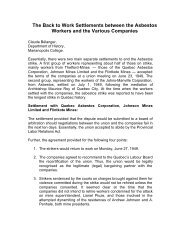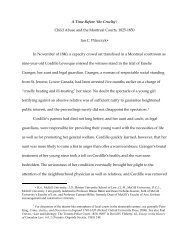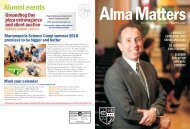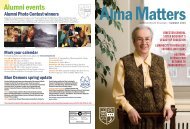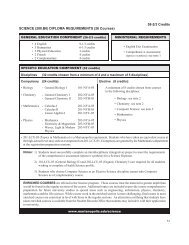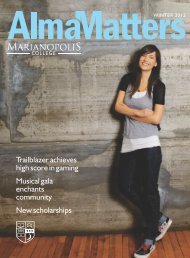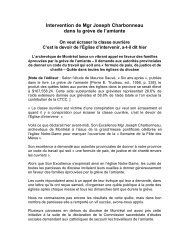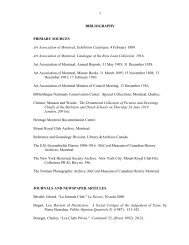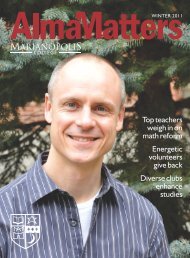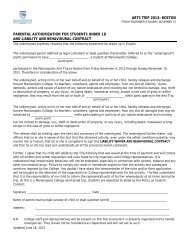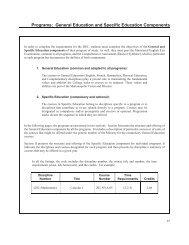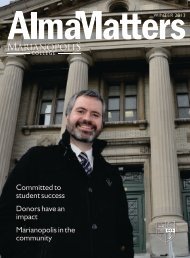Arts and Sciences: Art History - Art - BiologyEnvironmental EthicsMany people are concerned abouta variety of environmental issues,from pollution to global warming tothe extinction of species. They saythat we “should” do somethingabout those issues. But what ethicalassumptions underlie this “should”?Is it a concern for human well-being?For animals? For all living things?For ecosystems? In other words, what“things” count morally? Moreover,what does taking humans, animals,living things or ecosystems into moralconsideration involve?Video GamesThis course focuses on importantethical and social issues associatedwith video games. Students arerequired to consider video gamescritically and analytically from avariety of perspectives. The first partof the course provides students withthe historical, technical, cultural andphilosophical background necessaryfor them to accomplish this. Thesecond part of the course focuses onspecific social and ethical issues, suchas: health benefits and concerns;general effects of video games onreal-life behaviour; addiction andsocial isolation; virtual communitiesand economies; promotion ofviolence; in-game sexuality;censorship and rating systems;gender, race and other stereotypes;in-game propaganda and advertising;on-line gambling; piracy and hackerculture; cheating; video games as art;and educational applications.Art History (520)Thematic Studies In History of Art:Medieval and Renaissance Art520-903-MS (3-0-3) 2 creditsAn increasingly humanistic worldview began to emerge in WesternEurope between the eleventh and theearly sixteenth centuries, or in arthistorical terms, from Romanesqueto High Renaissance. The ways inwhich humanism affected the riseof naturalism, individualism, andclassicism in the arts provides acentral theme for students learningto understand the differences betweenthe later Middle Ages and theRenaissance in painting, sculptureand architecture.Art: 16th to 19th Century520-120-MS (3-0-3) 2 creditsBy examining the history of Europeanart from the end of the Renaissancethrough to nineteenth-centurymodernism in the context of thepolitical, religious, social andintellectual conditions of the time,students learn to identify the effects ofthe Reformation, the Enlightenmentand the Industrial Revolution onartistic production. They also becomefamiliar with the persistence of theclassical tradition, the main characteristicsof movements such as theBaroque, Neoclassicism, Romanticism,Realism and Impressionism and thestyles of significant artists within eachof these historical categories.Art (510)Introduction to Studio Art510-100-MS (3-0-3) 2 creditsThe aim of this foundation course isto encourage artistic discovery and todevelop hands-on skills and fluencyof expression in a variety of media.Fundamentals of drawing, painting,3-D architectural model construction,and digital imaging provide a base forcourse content.Biology (101)General Biology I101-701-MS (3-2-3) 2.66 creditsThis course investigates the levelsof organization of living organisms,their diversity and mode of life.Topics discussed include: thestructure and function of cells andcellular organelles; genetic materialand protein synthesis; cell division,Mendelian inheritance and populationgenetics; the diversity of the maintaxonomic groups; aspects of humanphysiology.Biology II101-702-MS (3-2-2) 2.33 creditsPrerequisite: General Biology I101-701-MSThis course discusses the molecularbasis of living organisms in thegeneral framework of cellularhomeostasis. The principal areas ofinvestigation include the following:biochemical structure and functionof macromolecules; enzymes andenzyme regulation; bioenergetics ofcellular respiration and photosynthesis;DNA replication and protein synthesis;regulation of gene expression; celldifferentiation; features of the immunesystem, cell signalling and responsemechanism.98
Arts and Sciences: Chemistry - Economics - German - MathematicsChemistry (202)Chemistry I202-701-MS (3-2-3) 2.66 creditsPrerequisite: Sec. V Chemistry(051504, 551504)This course introduces the moderntheories of the structures of atomsand molecules, the types of chemicalbonding, molecular geometry and thequalitative and quantitative way inwhich chemicals react with eachother in different types of reactions.The physical properties of gasses andsolutions are discussed while, in thelaboratory, basic manipulative skillsare taught.Chemistry II202-702-MS (3-2-2) 2.33 creditsPrerequisite: Chemistry I, 202-701-MSThis course studies the physicaland chemical properties of carboncontainingcompounds and the ratesand mechanisms of simple reactions.The following classes of compoundsare covered: alkyl halides, alcohols,alkanes, alkenes and alkynes, aromatics,aldehydes, ketones, carboxylicacids and their derivatives, amines,amino acids and carbohydrates.Economics (383)International Economics andPolitics383-701-MS (3-0-3) 2 creditsThis course introduces the student tothe world of globalization. Economicconcepts and indicators relevant tothe topics studied are examined,particularly those necessary toanalyze an economy operating in aglobal environment. The politicalcontext and the relevant geography,the existence of large trading blocks,the developing economies, andinternational political and economicagencies are studied. Other majortopics covered include the analysis ofthe processes, ideologies and issuespertinent to the question of globalization,the strategies used by the maineconomic players, and the advantagesand disadvantages of unregulatedglobalization.German (609)German I609-701-MS (3-0-2) 1.66 creditsThis introductory course in Germanuses a communicative approach. Fromthe beginning students learn to communicateeffectively in German. Thecontexts for practice are everydaysituations. New expressions, grammaticalstructures and vocabulary arereinforced through written and oralexercises, material on video, andpresentations on cultural topics.German IIPrerequisite: German I, or equivalent(with instructor’s permission)609-702-MS (3-0-2) 1.66 creditsThis course is for advancedbeginners. Students expand theirability to communicate in German asthey continue to acquire vocabularyand grammatical structures. Regularuse of audio-visual material providescultural context to topics discussedin class.609-712-MS (3-2-2) 2.33 creditsThis course is based on the 609-702course and includes an additionalweekly 2-hour lab component.Special Topics in German609-713-MS (3-2-2) 2.33 creditsOffered if enrolment is sufficient.Prerequisite: German II, or equivalent(with instructor’s permission)This intermediate-level course furtherdevelops the student's ability tocommunicate in German. Throughdirected exercises, group activities,and individual work, studentsimprove their speaking and writingskills. Special projects by studentsfocus on German culture andcontemporary topics.History (330)History of Western Civilization330-701-MS (3-0-3) 2 creditsThis course presents an overview ofthe evolution of western civilization:the historical roots and evolution ofpolitical, economic, social andreligious institutions; the majorpolitical ideologies; the cultural andintellectual heritage of the West andthe development of the Europeancompetitive-state system. Some of theaspects introduced include: theAncient and Medieval worlds, theRenaissance, the Reformation, theEnlightenment, the Age ofRevolutions, the IndustrialRevolution, 19th-century and 20thcenturyideologies, overseasimperialism, and the First and SecondWorld Wars.Mathematics (201)Differential Calculus201-701-MS (2-2-2) 2 creditsPrerequisite:Sec. V Math TS (064506, 564506), orSec. V Math SN (065506, 565506)Topics studied include limits, continuity,derivatives by definition, techniquesof differentiation, indeterminateforms and L’Hôpital’s Rule.Derivatives are applied to graphing,optimization problems, rates of99
- Page 2 and 3:
VISIONMarianopolis College, drawing
- Page 4 and 5:
GENERAL INFORMATION: Introduction t
- Page 6 and 7:
AdmissionsOUT-OF-PROVINCEAPPLICANTS
- Page 8 and 9:
Financial Information• Birks Fami
- Page 10 and 11:
Financial InformationConfirmation F
- Page 12 and 13:
Academic Information• Failure (EC
- Page 14 and 15:
Academic InformationThose who are a
- Page 16 and 17:
Rules and Regulationsand whether su
- Page 18 and 19:
EDUCATIONAL RESOURCES & SERVICESAss
- Page 20 and 21:
Educational Resources and ServicesS
- Page 22 and 23:
CHOOSING A PROGRAMDiploma Programs
- Page 24 and 25:
CertificatesSpecial InterestCertifi
- Page 26 and 27:
Programs: General Education and Spe
- Page 28 and 29:
General EducationGENERAL EDUCATION
- Page 30 and 31:
General Education: Englishidentifyi
- Page 32 and 33:
General Education: Englishas the fi
- Page 34 and 35:
General Education: Englishintended
- Page 36 and 37:
General Education: Frenchand curren
- Page 38 and 39:
General Education: Frenchce cours t
- Page 40 and 41:
General Education: HumanitiesHumani
- Page 42 and 43:
General Education: Humanitiesunders
- Page 44 and 45:
General Education: Humanitiespracti
- Page 46 and 47:
General Education: Humanitiespracti
- Page 48 and 49:
General Education: Physical Educati
- Page 50 and 51: General Education: ComplementaryCom
- Page 52 and 53: General Education: ComplementaryMod
- Page 54 and 55: SECTSpecificEducation Component- Sc
- Page 56 and 57: Science: Biology - ChemistryBiology
- Page 58 and 59: Science: Mathematics - PhysicsR and
- Page 60 and 61: 56-2/3 to 58 CreditsSOCIAL SCIENCE
- Page 62 and 63: Social Science: Profiles - General
- Page 64 and 65: Social Science: Psychology ProfileE
- Page 66 and 67: Social Science: Law, Society and Ju
- Page 68 and 69: Social Science: Honours CommerceHon
- Page 70 and 71: Social Science: Anthropology - Biol
- Page 72 and 73: Social Science: History - Mathemati
- Page 74 and 75: Social Science: Political Sciencedi
- Page 76 and 77: Social Science: Religion - Sociolog
- Page 78 and 79: 54-2/3 CreditsCREATIVE ARTS, LITERA
- Page 80 and 81: Creative Arts, Literature and Langu
- Page 82 and 83: Creative Arts, Literature and Langu
- Page 84 and 85: Creative Arts, Literature and Langu
- Page 86 and 87: Creative Arts, Literature and Langu
- Page 88 and 89: Creative Arts, Literature and Langu
- Page 90 and 91: Creative Arts, Literature and Langu
- Page 92 and 93: 58-2/3 CreditsMUSIC (501.A0) DIPLOM
- Page 94 and 95: MusicEar Training and Theory IV551-
- Page 96 and 97: 59-1/3 CreditsARTS AND SCIENCES (70
- Page 98 and 99: Arts and Sciences: English - Humani
- Page 102 and 103: Arts and Sciences: Mathematics - Mu
- Page 104 and 105: Arts and Sciences: Multidisciplinar
- Page 106 and 107: 56-2/3 to 58 CreditsLIBERAL ARTS (7
- Page 108 and 109: Liberal Artsof evolution; the first
- Page 110 and 111: Liberal ArtsOptionalIn addition to
- Page 112 and 113: Teaching FacultyFLEISCHER, George T
- Page 114 and 115: Teaching FacultyTRILLER, Bernice Sh
- Page 116: INDEX II: Programs and CoursesGener



